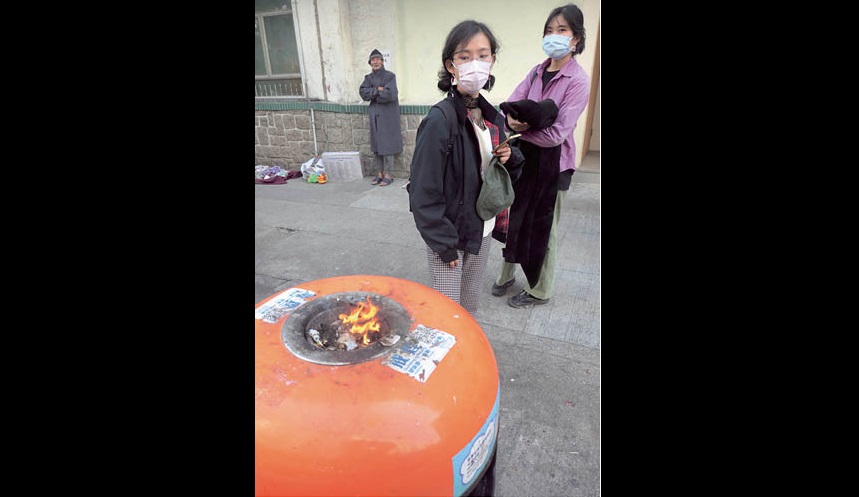Reviews & Articles
政府決策,不如自救 | Self-help replacing government decision-making
John BATTEN
at 2:46pm on 24th February 2020

圖片說明:
兩位朋友準備撲滅垃圾桶小火。2020年,香港九龍石硤尾。(照片由作者提供。)
Caption:
Two friends about to extinguish a fire in a rubbish bin, Shek Kip Mei, Kowloon, Hong Kong, 28 January 2020. (Photo: John Batten).
(Please scroll down for English version)
不少香港人視張國榮自殺的悲劇為2003年本港沙士爆發的真正開始。張氏於2003年4月1日身亡,香港在翌日全面進入沙士防疫狀態。不久之後,淘大花園疫情爆發,出現大規模感染和死亡個案,顯示情況嚴峻。現時武漢新型冠狀病毒的疫情,也有類似的重要開始日期:2020年送豬迎鼠的農曆新年。正如近期連場反政府示威中可見,市民要靠自己主動回應重大和具爭議性的問題。香港市民自發地在農曆年假全體戴上口罩來應對各種媒體報道,特別是武漢市政府終於承認病毒疫情較原先所報道的嚴重。
在恍如隔世的年初四,我與兩位年輕朋友會面,他們各自戴上口罩,幾乎和其他所有人一樣,採取了防護措施。我們走過石硤尾,看到一個垃圾桶頂部起火,燻燒的煙頭中加入了塑膠物料。我們停下來,我拍下快照,一位朋友準備從袋中拿出瓶裝水來撲熄火種,另一位朋友笑了,因為我們打趣說火在這裏出現實在古怪。我們不遠處還有長者,他也在大笑。他通常都會站在行人天橋下的這個角落擺賣小物品。這幀照片一方面捕捉了新型冠狀病毒下的農曆年時刻,一方面也令人回想起數天前和過去幾個月來的香港示威:當很多垃圾桶都被移離路面,以防成為示威時堵路的路障之際,垃圾桶內的這場小火便標記着香港一些最基本但尚未解決的社會與政治問題。
所有讓火種有意無意燃燒的東西,至今仍然存在,不管這出現在一個垃圾桶或一條街道,以至其他帶有政治和社會隱喻的意象。城市的所有不滿,至今仍然存在,儘管現時新型冠狀病毒的疫情正在「分散視線」。我城的弱勢政府,至今仍然存在。執筆之時,政府仍就是否全面封關猶疑豫不決。隨着國際間多家航空公司取消前往中國的航班,以及各國政府要求旅客抵達時自我隔離十四天,事件肯定會再次打擊港府。保持連接內地的口岸開放,香港將無可避免被更多國家封鎖。只要在一段時間封關,香港確實有機會減少新型冠狀病毒擴散的恐慌,繼續營運其作為亞洲最重要金融中心的業務。現在菲律賓政府已對中國,包括香港在內,進行禁飛和檢疫要求。
政府回應夏季示威事件的模式,至今仍然持續。香港政府不僅沒有正視公眾對新型冠狀病毒的反應,馬上採取行動,反而要先聽取中央意見才能啟動和公布抗疫措施。進一步打擊政府的,是中聯辦確認,特區政府曾就此諮詢意見。一如我們在夏季示威那幾個月所見,政府、部門和政策的決策緩慢、讓人憂慮,而且遲疑不決。說來委實諷刺:香港政府親手削弱自己在一國兩制管治安排下的高度自治。另一方面,各個專業界別,例如醫護人士,完全洞悉這種高層不決策情況,他們和所有其他市民一樣,自行採取更積極的行動,解決社會和政治問題。其中醫療工作者就基於社區健康理由,發動了前所未有的工業行動,務求迫使政府對內地口岸封關。
在接下來的幾個月,預期隨着新型冠狀病毒疫情自然減退,我們將看到更多防範於未然的自救,還有社會各界和商界在政府高層不作為下,合力在社區和政治層面採取行動。當然,與這些自救行動同時出現的,還有對政府遞增的批評。這些批評將來自整個政治光譜,不論是藍或黃,不論是民主派還是建制派。2003年7月1日,一百萬人在沙士疫情結束後上街,抗議董建華政府處理沙士和擬為廿三條立法。其後多名局長辭職。2020年,又回到同一個循環!
原文刊於《明報周刊》,2020年2月13日
Self-help replacing government decision-making
by John Batten
The tragedy of Leslie Cheung’s suicide is viewed by many Hongkongers as the real start of Hong Kong’s SARS outbreak in 2003. Cheung died on April Fool’s Day -1 April 2003 -and the following day Hong Kong was in full-blown SARS-defence mode. Soon after, the Amoy Gardens outbreak with its mass infections and deaths emphasized the seriousness of the situation. The current Wuhan coronavirus outbreak will have a similarly significant calendar date to mark its beginning: Lunar New Year 2020 celebrating the Year of the Rat. And, as seen so often during the recent anti-government protests, the public itself took the initiative about an important and controversial issue. Hong Kong residents spontaneously donned face masks en masse during the new year holidays, responding to a variety of media reports, particularly Wuhan city government’s announcement finally admitting the virus outbreak was more serious than had initially been reported.
On the fourth day of the new year, which already feels ages ago, I met two young friends who were each clad in a face mask, taking precautions like almost everyone else. Walking through Shek Kip Mei we saw the top of a rubbish bin on fire, some plastic material had been dropped in amongst the smoldering cigarette butts. We stopped and I snapped a photograph as one friend is about to reach inside her bag for a water bottle to put the fire out, the other friend is smiling as we joked about the strangeness of the fire being there. In the background is an old man, also laughing; it is the same man who often stands on this corner under the pedestrian overpass, selling bits and pieces. This photograph catches a coronavirus new year moment, but it also harks back to a few days earlier and the months of Hong Kong’s protests: that small fire in a rubbish bin, when so many bins have been removed from the streets for fear they will just be added to a street barricade during a protest rally, is emblematic of Hong Kong’s underlying and still unresolved social and political issues.
All the conditions remain for more fires to spontaneously ignite or be purposely lit, whether it is in a rubbish bin, on a street, or as a metaphor for an underlying political or social issue. All the city’s grievances remain, despite the ‘distraction’ of the coronavirus outbreak. Our city’s weak government remains, fluffing about, as I write, whether to fully close our borders with the mainland. Events will surely overtake the government yet again as international airlines are cancelling flights into China and governments worldwide are demanding travelers quarantine themselves for 14 days after arrival in their countries. By keeping its borders open with the mainland, Hong Kong’s porous border with China will inevitably lead to its own territory being included in the quarantine requirements of more countries. Hong Kong has an opportunity to contain the fear of spreading the coronavirus and remain open ‘for business’, at least as Asia’s most important financial centre, if it closes all mainland borders temporarily. The Philippine government has already included Hong Kong in its blanket travel ban and quarantine requirements for anyone arriving from the mainland.
The pattern seen over the summer protests months continues. Rather than gauging the public’s new year reaction to the coronavirus and immediately responding to it, the Hong Kong government instead consulted the Central authorities before initiating and announcing their own responses to the Wuhan coronavirus outbreak. Further undermining the government, the Liaison Office confirmed that the SAR government had made these consultations. As seen throughout the recent summer protests months, government, ministerial and policy decision-making is slow-moving, apprehensive and indecisive. It is an almost-irony: the government itself undermining Hong Kong’s high degree of autonomy under the ‘one country, two systems’ governance arrangements. On the other hand, the professions, such as health professionals, have understood this top-level indecision-making and will increasingly act, just like the public, to initiative their own solutions for social and political problems. Health workers, for example, have taken unprecedented industrial action in Hong Kong’s hospitals to force a community health initiative, the closure of Hong Kong’s borders with the mainland, onto the government.
Over the next months, as the coronavirus outbreak slowly resolves itself, we will see more preemptive self-help, community and political initiatives by all sectors of society and business to work around top-level government inertia. Alongside these self-help initiatives will be increased criticism of the government - across the entire political spectrum, both blue and yellow, pro-democrat and pro-establishment. On 1 July 2003, just after the conclusion of the SARS outbreak, one million people marched and protested against Tung Chee-hwa’s government and its handling of SARS and proposals for Article 23 national security legislation. Ministerial resignations followed. History is circular and relevant in 2020!
This article was originally published in Ming Pao Weekly on 13 February 2020. Translated into Chinese by Aulina Chan.
